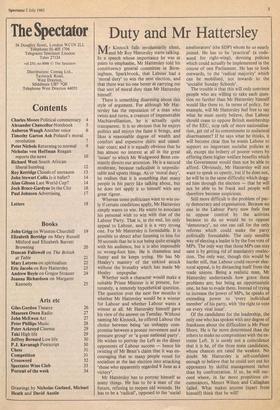Duty and Mr Hattersley
Mr Kinnock falls involuntarily silent, and Mr Roy Hattersley starts talking. In a speech whose importance he was at pains to emphasise, Mr Hattersley told his constituency general committee in Birm- ingham, Sparkbrook, that Labour had a `moral duty' to win the next election, and that there was no one better at carrying out that sort of moral duty than Mr Hattersley himself.
There is something disarming about this style of argument. For although Mr Hat- tersley has the reputation of a man who twists and turns, a creature of impenetrable Machiavellianism, he is actually quite transparent. It is so obvious that he enjoys politics and enjoys the fame it brings, and likes a reasonable degree of wealth and comfort and expensive shirts and camel- hair coats; and it is equally obvious that he has almost no interest at all in the great `issues' to which Mr Wedgwood Benn con- stantly directs our attention. He is a natural moderate, because radicalism is unpredic- table and upsets things. As to 'moral duty', he realises that it is something that many people in his party like talking about, but he does not apply it to himself with any great rigour.
Whereas some politicians want to win on- ly if certain conditions apply, Mr Hattersley simply wants to win. He wants to associate his personal wish to win with that of the Labour Party. That is, in the end, his only appeal to Labour, and it is a very strong one. For Mr Hattersley is formidable. It is possible to detect after listening to him for 30 seconds that he is not being quite straight with his audience, but it is also impossible to wrong-foot him. He is shameless and funny and he keeps trying. He has Mr Healey's mastery of the unkind attack without the brutality which has made Mr Healey unpopular.
Whether such a character would make a suitable Prime Minister is at present, for- tunately, a remotely hypothetical question. The question over the next few months is whether Mr Hattersley would be a winner for Labour and whether Labour wants a winner at all. Mr Hattersley himself gave his view of the answer on Tuesday. Without naming Mr Kinnock, he offered Labour the choice between being 'an unhappy com- promise between a protest movement and a pressure group' or 'a great national party'. He wishes to portray the Left as the direct opponents of Labour success — hence his twisting of Mr Benn's claim that it was en- couraging that so many people voted for socialism at the last election into attacking `those who apparently regarded 9 June as a victory'.
Mr Hattersley has to portray himself as many things. He has to be a man of the future, refusing to reopen old wounds. He has to be a 'radical', opposed to the 'social ameliorators' (the SDP) whom he so nearly joined. He has to be 'practical' (a code- word for right-wing), devising policies which could actually be implemented in the course of one Parliament. He has to look outwards, to the 'radical majority' which can be mobilised, not inwards to the `socialist Sunday Schools'.
The trouble is'that this will only convince people who are willing to take each ques- tion no further than Mr Hattersley himself would like them to. In terms of policy, for example, will Mr Hattersley feel free to say what he must surely believe, that Labour should cease to oppose British membership of the EEC, stop talk of more nationalisa- tion, get rid of its commitment to unilateral disarmament? If he says what he thinks, it will become clear that he wants Labour to support no important socialist policies at all, except the bribery of poorer voters by offering them higher welfare benefits which the Government would then not be able to afford. Obviously, Mr Hattersley will not want to speak so openly, but if he does not, he will be in the same difficulty which dogg- ed him through the election — that he will not be able to be frank and people will therefore become suspicious.
Still more difficult is the problem of par- ty democracy and organisation. Because no one in the Labour Party now feels free to oppose control by the activists because to do so would be to oppose `democracy', no one can call for the only reforms which could make the party politically formidable. The only sensible way of electing a leader is by the free vote of MPs. The only way that those MPs can stay sane is by getting rid of mandatory reselec- tion. The only way, though this would be harder still, that Labour could recover elec- toral appeal, is by distancing itself from the trade unions. Being a realistic man, Mr Hattersley understands how grave these problems are; but being an opportunistic one, he has to evade them. Instead of trying to increase the 'power of MPs, he speaks of extending power to 'every individual member' of his party, with 'the right to vote on every vital issue'.
Of the candidates for the leadership, the only one who has spoken with any degree of frankness about the difficulties is Mr Peter Shore. He is far more determined than the others to make no compromises with the ex- treme Left. It is surely not a coincidence that it is he, of the three main candidates, whose chances are rated the weakest. No doubt Mr Hattersley is self-confident enough to believe that he could sort out his opponents by skilful management rather than by confrontation. If so, he will suc- ceed where, in far more propitious cir- cumstances, Messrs Wilson and Callaghan failed. What makes anyone (apart from himself) think that he will?






































 Previous page
Previous page